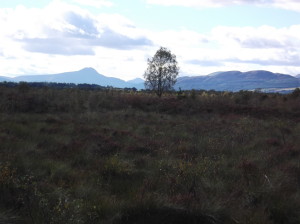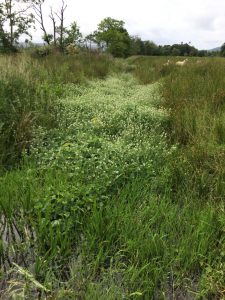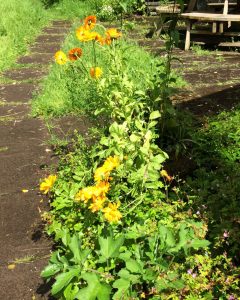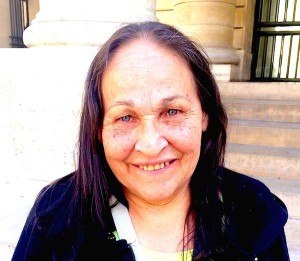 I have a poem called ‘Grounded’ in which I talk about the state of the soil round here, the flat waterlogged fields – which are by no means as sterile and inhospitable as they were when I wrote it five years ago – and the rich silty loam over clay in our gardens, which has been cultivated for a good 800 years and is full of the seeds sown by the monks and rope-makers and miners who lived here before us. I like the feeling that my poems, as well as the herbs, are grounded in the place where I live, and that they are a natural part of the conversation humans have with the world around them. But there is another discernible trend in the way poets relate to landscape.
I have a poem called ‘Grounded’ in which I talk about the state of the soil round here, the flat waterlogged fields – which are by no means as sterile and inhospitable as they were when I wrote it five years ago – and the rich silty loam over clay in our gardens, which has been cultivated for a good 800 years and is full of the seeds sown by the monks and rope-makers and miners who lived here before us. I like the feeling that my poems, as well as the herbs, are grounded in the place where I live, and that they are a natural part of the conversation humans have with the world around them. But there is another discernible trend in the way poets relate to landscape.
When things get a bit apocalyptic, a common response is to get back to nature, get back to the land. You get pastoral poetry, or the Romantics, or the Wilderness Poetry of the Chinese classical tradition. Sometimes it is seen in the appreciation of the work of poets who live in rural locations – Clare, for instance, or Wordsworth. More often it sparks writing from people who have moved to the country – Irish or Chinese hermits, exiled Romans – or Coleridge, whose life in the Lakes was motivated by a desire for revolution and a completely new society.
In prosperous times people talk about Pastoral poetry as escapist, artificial, even delusional, as if there was nothing more to it than Marie Antoinette playing milkmaids. But it can be a vehicle for biting political satire, for genuine social protest, or for deep personal or religious reflection. What it is not, very often, is anything to do with the environment. Nature is often no more than either a metaphor or a backdrop for the human questions under investigation. Geopoetics aimed to do something about that, to connect directly to the earth, sky and sea without obtruding human self-obsession into the work, and the oriental verse-forms and poetics formed a good medium to do so, but it leaves poetry quite detached, descriptive and cerebral. I have loved this, and still do – it has honed a style I find very sympathetic to the way my brain works. But I’m finding it a bit one-dimensional now.
I don’t like nature writing that is simply aesthetic, where the experience of wildness is ‘a treat’ – especially if it is a treat reserved only for the worthy. The standpoint of the detached observer who sets himself apart or in opposition to nature is as artificial as the quaint, the sentimental or the anthropomorphic. And I don’t like the way nature has become exotic, which enables us to protect otters, have safaris to see lions, and at the same time, want to exterminate town pigeons or himalayan balsam. What I’m looking for is ‘grounded’ poetry, where the life of the human is embedded in and engaged with nature, where human life is as natural as a spider’s, a kingfisher’s, an orchid’s.
Which brings me to Patrick Kavanagh. 
He was a farmer in his youth, and lived as a writer later on, succumbing to poverty, ill-health and alcohol in 1967. His early poems are lyrical and lovely – Beech Tree, Four Birds –
Kestrel
In a sky ballroom
The kestrel,
A stately dancer.
He is a true artist –
His art is not divorced
From life and death.
full of rich sensual language and detailed intimate observation.
But there are also poems full of grim depictions of peasant life – the back-breaking hard work, the poverty, the isolation, the prison-grip of families that need so much of their children, the lost opportunities, narrow horizons and the casual cruelties of small town living, where everyone knows everyone else, and stepping outside the norm is resented.
Later there are poems about the loss of that lyrical vision, about the hollowness of life of an urban poet, without roots or convictions, the artistic politics, fads and affectations, and glimpses of the possibilities and promises of his old life, sometimes cynical, sometimes longing. It was a problem he never seemed to have resolved.
And neither have I. This is a temptation we fall into often. Surely one of these attitudes is ‘right’, the ‘real truth’? The other must be self-deception, or ignorance, or wishful thinking, no? I don’t think so. I don’t think that the countryside is nurturing and fruitful and lovely ‘in spite’ of the bad days. I don’t think the countryside is an uncouth wasteland ‘in spite’ of looking pretty when you’re on holiday. I think wherever you live, you grapple with bliss and bale, wherever you live you have to deal with life as you find it, and nature is wherever we live, not reduced to the margins, not a treat, or a decoration, or a pest. And poetry that deals with it is not marginal or decorative or necessarily consoling either.
So, far from seeing the ‘get back to nature’ impulse as a refuge from the hard things of our lives, I am suggesting that poetry properly grounded in nature as fully as it is in our human consciousness might help us to identify and understand them better.
And I am suggesting that you should go read Patrick Kavanagh. He’ll blow your socks off.



 Last year at the Edinburgh Book Festival I heard three Innu poets read, powerful, compelling poems about the relationships of the Innu and their homeland, and the way the western culture distorts and oppresses both earth and people. (More about this event
Last year at the Edinburgh Book Festival I heard three Innu poets read, powerful, compelling poems about the relationships of the Innu and their homeland, and the way the western culture distorts and oppresses both earth and people. (More about this event  I have a poem called ‘Grounded’ in which I talk about the state of the soil round here, the flat waterlogged fields – which are by no means as sterile and inhospitable as they were when I wrote it five years ago – and the rich silty loam over clay in our gardens, which has been cultivated for a good 800 years and is full of the seeds sown by the monks and rope-makers and miners who lived here before us. I like the feeling that my poems, as well as the herbs, are grounded in the place where I live, and that they are a natural part of the conversation humans have with the world around them. But there is another discernible trend in the way poets relate to landscape.
I have a poem called ‘Grounded’ in which I talk about the state of the soil round here, the flat waterlogged fields – which are by no means as sterile and inhospitable as they were when I wrote it five years ago – and the rich silty loam over clay in our gardens, which has been cultivated for a good 800 years and is full of the seeds sown by the monks and rope-makers and miners who lived here before us. I like the feeling that my poems, as well as the herbs, are grounded in the place where I live, and that they are a natural part of the conversation humans have with the world around them. But there is another discernible trend in the way poets relate to landscape.